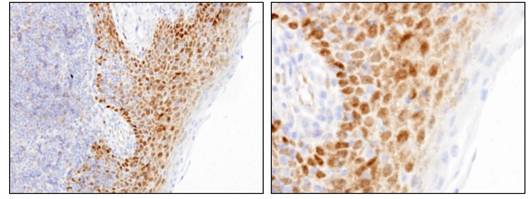A recent PLoS One paper from Oxford University shows the use of Anti-FOXP2, clone 73A/8 in chromatin immunoprecipitation and immunohistochemistry. This paper supports the model that a transient upregulation of Foxp2 in pre-osteoblast mesenchymal cells regulates a p21-dependent growth arrest checkpoint, which may have implications for normal mesenchymal and osteosarcoma biology.
Anti-FOXP2, clone 73A/8 was developed, by Alison Banham, Andrew Campbell, Duncan Gascoyne and Linden Lyne at Oxford University, in order to display that aberrant expression of FOXP2 is associated with certain cancers. The development of Anti-FOXP2, clone 73A/8 enabled the discovery that FOXP2 could be used as a novel marker to diagnose the plasma cell malignancy multiple myeloma and a pre-malignant condition known as monoclonal gammopathy of undetermined significance. Previously FOXP2 had only been associated with a severe speech and language defect.
Professor Alison Banham leads the Leukaemia and Lymphoma Research/ Cancer Research UK Haemato-oncology Group at Oxford University. Banham is very experienced in monoclonal antibody production and characterisation. Her group is actively involved in the European Monoclonal Antibody Network, which represents the first European network of laboratories linked to academic Institutions, each having an internationally recognized reputation in the production and use of monoclonal antibodies. The head of Ximbio portfolio sourcing, Jaya Shrivastava will be attending thier annual meeting in September.

The imaged above show immunohistochemistry of formalin fixed paraffin embedded reactive human tonsil with Anti-FOXP2, clone 73A/8 at low and high power respectively, showing strong nuclear labelling of epithelium.
View the datasheet for more information and publications.
HAVE YOU REGISTERED?
Join the ever-growing global Ximbio community. Register and receive updates about new reagents, institutes and new features being added to the website.
